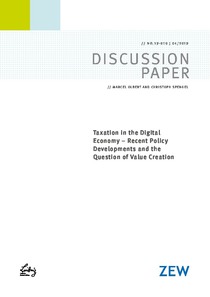Taxation in the digital economy – recent policy developments and the question of value creation
"The paper reviews the evidence on the challenges of digitalization for direct (corporate profit) and indirect (consumption) taxation. Based on both anecdotal and empirical evidence, we evaluate ongoing developments at the OECD and European Union level and argue that there is no justification f...
| Main Authors: | , |
|---|---|
| Institution: | ETUI-European Trade Union Institute |
| Format: | TEXT |
| Language: | English |
| Published: |
Mannheim
2019
ZEW |
| Subjects: | |
| Online Access: | https://www.labourline.org/KENTIKA-19308137124911263199-Taxation-in-the-digital-econom.htm |
| Summary: | "The paper reviews the evidence on the challenges of digitalization for direct (corporate profit) and indirect (consumption) taxation. Based on both anecdotal and empirical evidence, we evaluate ongoing developments at the OECD and European Union level and argue that there is no justification for introducing a new tax order for digital businesses. In particular, the significant digital presence and the digital services tax as put forward by the European Commission will most likely distort corporate decisions and spur tax competition. To contribute to the development of tax rules in line with value creation as the gold standard for profit taxation the paper discusses data as a "new" value-driving asset in the digital economy. It draws on insights from interdisciplinary research to highlight that the value of data emerges through proprietary activities conducted within businesses. We ultimately discuss how existing transfer pricing solutions can be adapted to business models employing data mining." |
|---|---|
| Physical Description: | 31 p. Digital |

